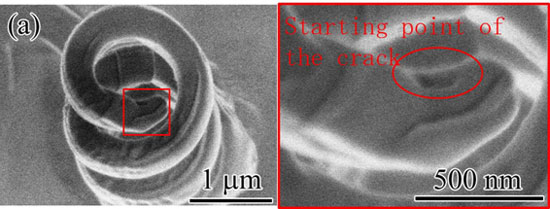| Mar 06, 2013 |
Carbon nanocoils fracture like an automobile spring
|
|
(Nanowerk News) Carbon nanocoils (CNCs) composed of helical shaped carbon nanofibers have potential applications including mechanical springs, nano-solenoids, and field emitters.
|
|
However, in spite of the important applications of CNCs as mechanical spring for nano-eletcromechanical system (NEMS) there is a scarcity of data on CNC fracturing under tensile loads.
|
|
In new work ("Torsion fracture of carbon nanocoils "), Taiichiro Yonemura and colleagues at Toyohashi University of Technology describe the CNC fracturing properties of eight CNCs using focused ion beam (FIB) modification.
|
 |
| Carbon nanocoils
|
|
CNC tensile tests were conducted as follows: The CNCs were installed into an FIB system with a tungsten (W) probe with a 500 nm tip diameter and the W probe moved until it adhered to CNC using Pt ion beam whereas the Si ion beam cut the CNC bottom; then the CNC-adhered W probe approaches a Si substrate surface, until the CNC was almost perpendicularly to the Si substrate. Tensile tests for 8 CNCs were carried out by gradually changing the distance between the Si substrate and the W probe.
|
|
The elongation behavior of CNCs in the FIB instrument was monitored. Experiments showed the CNC coil pitch to return to its original length after fracturing, thus confirming CNC to be a spring. The average stretch ratio of the 8 CNCs on the verge of fracture was 150%.
|
|
The ratio of the maximum to average stress on the fractured surface was estimated to be in the range 1.3 to 1.7 indicating stress concentrations on the coil wire inner edge, and scanning microscopy confirmed a hollow region on the inner edge of all fractured surfaces.
|
|
The starting point of the CNC fracturing observed in the inner edge matched that of industrial steel coil springs used in automobiles.
|

